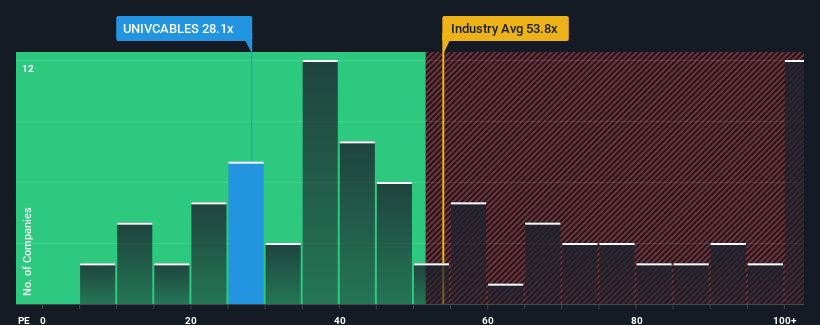- India
- /
- Electrical
- /
- NSEI:UNIVCABLES
Universal Cables Limited (NSE:UNIVCABLES) Stock Catapults 26% Though Its Price And Business Still Lag The Market

Despite an already strong run, Universal Cables Limited (NSE:UNIVCABLES) shares have been powering on, with a gain of 26% in the last thirty days. Looking back a bit further, it's encouraging to see the stock is up 97% in the last year.
In spite of the firm bounce in price, Universal Cables' price-to-earnings (or "P/E") ratio of 28.1x might still make it look like a buy right now compared to the market in India, where around half of the companies have P/E ratios above 35x and even P/E's above 67x are quite common. However, the P/E might be low for a reason and it requires further investigation to determine if it's justified.
For example, consider that Universal Cables' financial performance has been poor lately as its earnings have been in decline. One possibility is that the P/E is low because investors think the company won't do enough to avoid underperforming the broader market in the near future. However, if this doesn't eventuate then existing shareholders may be feeling optimistic about the future direction of the share price.
See our latest analysis for Universal Cables

What Are Growth Metrics Telling Us About The Low P/E?
Universal Cables' P/E ratio would be typical for a company that's only expected to deliver limited growth, and importantly, perform worse than the market.
If we review the last year of earnings, dishearteningly the company's profits fell to the tune of 8.4%. Even so, admirably EPS has lifted 61% in aggregate from three years ago, notwithstanding the last 12 months. Although it's been a bumpy ride, it's still fair to say the earnings growth recently has been more than adequate for the company.
Comparing that to the market, which is predicted to deliver 26% growth in the next 12 months, the company's momentum is weaker based on recent medium-term annualised earnings results.
With this information, we can see why Universal Cables is trading at a P/E lower than the market. It seems most investors are expecting to see the recent limited growth rates continue into the future and are only willing to pay a reduced amount for the stock.
What We Can Learn From Universal Cables' P/E?
The latest share price surge wasn't enough to lift Universal Cables' P/E close to the market median. Typically, we'd caution against reading too much into price-to-earnings ratios when settling on investment decisions, though it can reveal plenty about what other market participants think about the company.
We've established that Universal Cables maintains its low P/E on the weakness of its recent three-year growth being lower than the wider market forecast, as expected. At this stage investors feel the potential for an improvement in earnings isn't great enough to justify a higher P/E ratio. Unless the recent medium-term conditions improve, they will continue to form a barrier for the share price around these levels.
Having said that, be aware Universal Cables is showing 3 warning signs in our investment analysis, and 2 of those are concerning.
You might be able to find a better investment than Universal Cables. If you want a selection of possible candidates, check out this free list of interesting companies that trade on a low P/E (but have proven they can grow earnings).
New: AI Stock Screener & Alerts
Our new AI Stock Screener scans the market every day to uncover opportunities.
• Dividend Powerhouses (3%+ Yield)
• Undervalued Small Caps with Insider Buying
• High growth Tech and AI Companies
Or build your own from over 50 metrics.
Have feedback on this article? Concerned about the content? Get in touch with us directly. Alternatively, email editorial-team (at) simplywallst.com.
This article by Simply Wall St is general in nature. We provide commentary based on historical data and analyst forecasts only using an unbiased methodology and our articles are not intended to be financial advice. It does not constitute a recommendation to buy or sell any stock, and does not take account of your objectives, or your financial situation. We aim to bring you long-term focused analysis driven by fundamental data. Note that our analysis may not factor in the latest price-sensitive company announcements or qualitative material. Simply Wall St has no position in any stocks mentioned.
Have feedback on this article? Concerned about the content? Get in touch with us directly. Alternatively, email editorial-team@simplywallst.com
About NSEI:UNIVCABLES
Universal Cables
Manufactures and sells electrical and other cables, capacitors, wires and conductors, and other products under the UNISTAR brand name in India and internationally.
Adequate balance sheet slight.
Market Insights
Community Narratives



